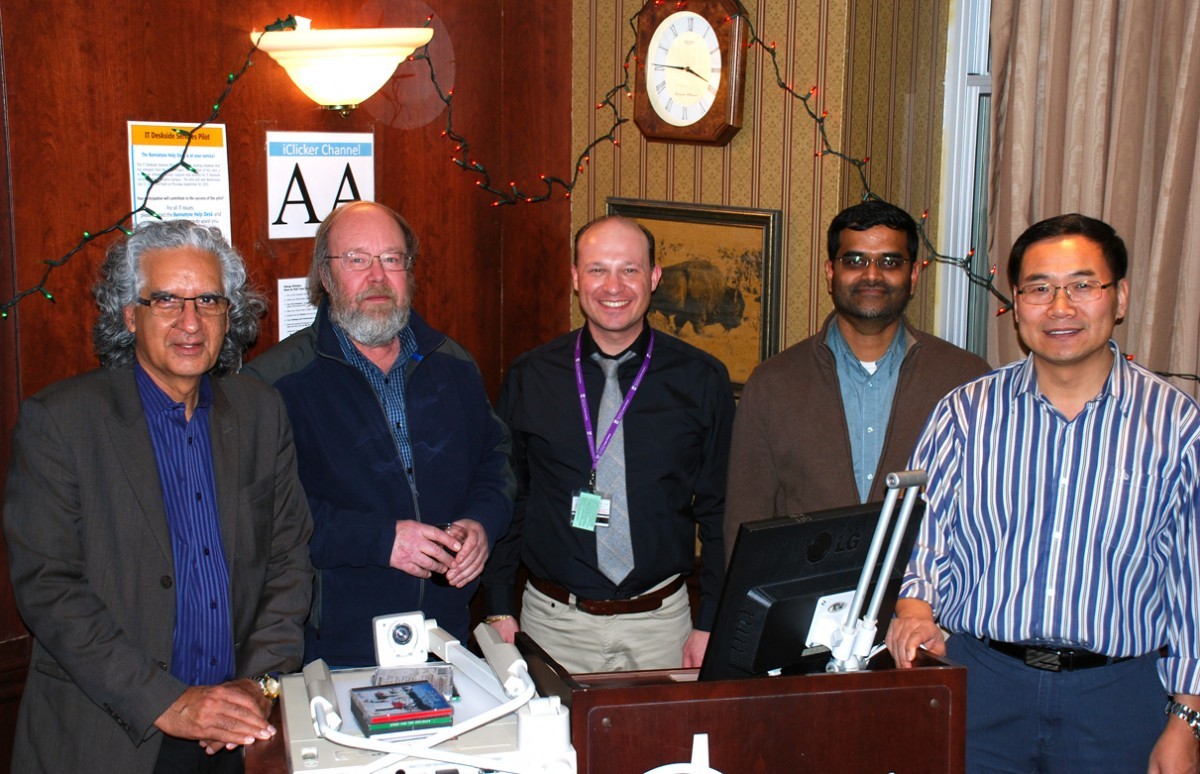
MCSB: (l-r) Drs. Raj Bhullar, J. Elliott Scott, Robert Schroth, Prashen Chelikani and Kangmin Duan. Missing are Drs. Shyamala Dakshinamurti, Ayush Kumar and Rotimi Aluko.
New research group offers big potential
U of M team first in Canada to focus on taste and chemosensory biology
It could well be the fastest growing and potentially impactful area of research in all of Canada. And, thanks to a group of forward–thinking and like–minded academics, the University of Manitoba is home to the only research group in the nation focused on it.
The Manitoba Chemosensory Biology Research Group (MCSB) launched this past summer with a focus on the emerging field of chemosensation. A diverse group of researchers is exploring molecular, chemical and sensory biology towards the discovery of novel molecules that can alter or modify human chemical senses. The potential for the group is enormous in what is seen as a burgeoning area of research.
“It is an up and coming area,” said Dr. Prashen Chelikani, director, MCSB group and graduate chair in the College of Dentistry’s department of oral biology. “The work we are doing is multi-disciplinary and fairly well focused. When it comes to taste chemosensation, we are the only group in Canada right now.”
The four thrust areas of MCSB – taste, bacterial chemosensation, signal transduction and clinical applications of the science – cover virtually all areas of the human chemosensory experience. Potential applications from their research run the gamut from the food industry to clinical applications in myriad areas of health care.
“Clinical, pharmacology, consumer products, all those areas,” Chelikani said. “We’re looking at research on taste receptor biology, taste disorders, food chemistry, novel taste blockers and taste modifiers.”
Comprised of eight scientists from diverse disciplines across the University of Manitoba, the group targets research grants that fit with their areas of expertise. For the past several years now and in collaboration with Dr. Rotimi Aluko (dept. of human nutritional sciences), Chelikani’s lab has focused on developing taste modifiers. This area has already drawn immense interest from the food industry.
The group’s work however, goes well beyond consumer products. Microbiologists Drs. Ayush Kumar and Kangmin Duan are investigating how bacteria communicate with each other and with a host cell, a major factor in bacterial infections.
“We want to understand the mechanisms of antibiotic resistance and virulence in bacteria like Pseudomonas aeruginosa,” Kumar explained. “This organism is one of the most common pathogens causing lung infections in Cystic Fibrosis patients. Our role in the group is to understand how it may interact with the host defense mechanisms and if this interaction is linked to its antibiotic resistance.”
Collaborative research within MCSB is investigating the interactions between bacterial Acyl-Homoserine Lactones (AHL )signal molecules and human airway cells. The phenomenon that bitter taste receptors on lung epithelial cells serve as bacterial AHL receptors is being explored.
Dr. Robert Schroth, associate professor, Colleges of Dentistry, is interested in looking at the association between caries and taste in children and adolescents.
“This partnership will help to understand the role that taste may have in determining a child’s risk for developing caries (cavities), including early childhood caries,” he said.
To spur their research, members of the group review calls for research projects that dovetail into their respective areas of expertise. “When we apply for grants, we look at our own research and how we can mutually complement our expertise to strengthen the proposal,” Chelikani said, noting competition is often fierce for grant funding.
“The climate for peer–reviewed granting funding is very tough right now. You’re looking at 10 to 15 per cent success, depending on what you are applying for. In that scenario, collaboration is essential.”
Each member of the team has already enjoyed considerable success in their respective fields. The group is optimistic that banding together under the MCSB banner can better leverage future opportunities.
“We know we are focused and most of our principle investigators have good track records and significant, multi–year grants,” Chelikani said, adding it usually takes up to five years for a research group to determine how well it is performing. “The idea is for this group to become a Canadian Centre for Chemosensory Research down the road.”
The new multi-disciplinary Manitoba Chemosensory Biology Research Group builds on the College of Dentistry’s successful International Centre for Oral-Systemic Health (ICOSH), launched in 2008, and also envisioned as a nucleus for collaboration and innovation.
“ICOSH has received multiple international awards and recognition along with substantial government and private funding so we already know this model works. Dr. Chelikani is uniquely qualified to lead this new group and I have no doubt that it will be extremely successful,” said Dr. Anthony M. Iacopino, Dean, College of Dentistry, Faculty of Health Sciences.
Research at the University of Manitoba is partially supported by funding from the Government of Canada Research Support Fund.






